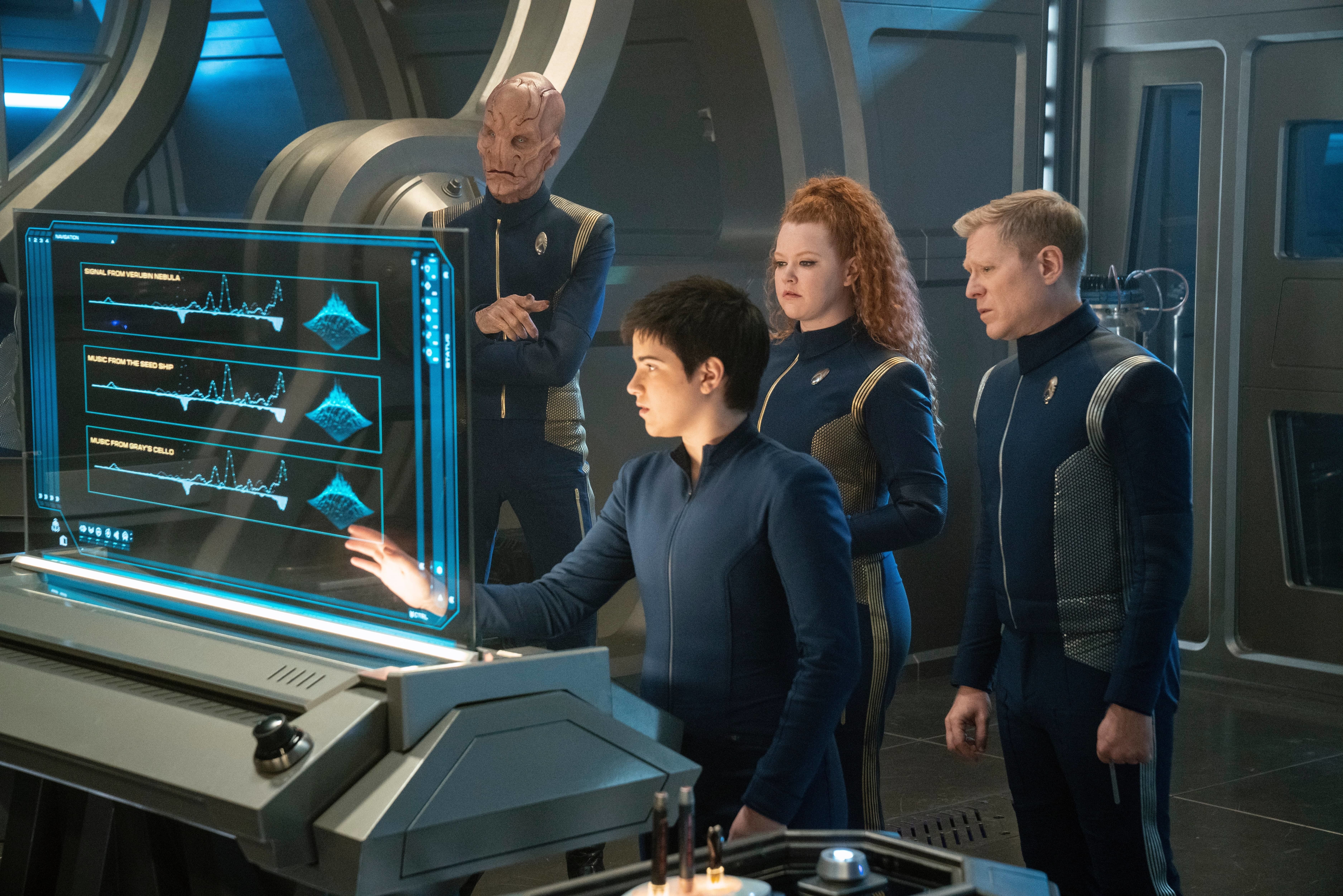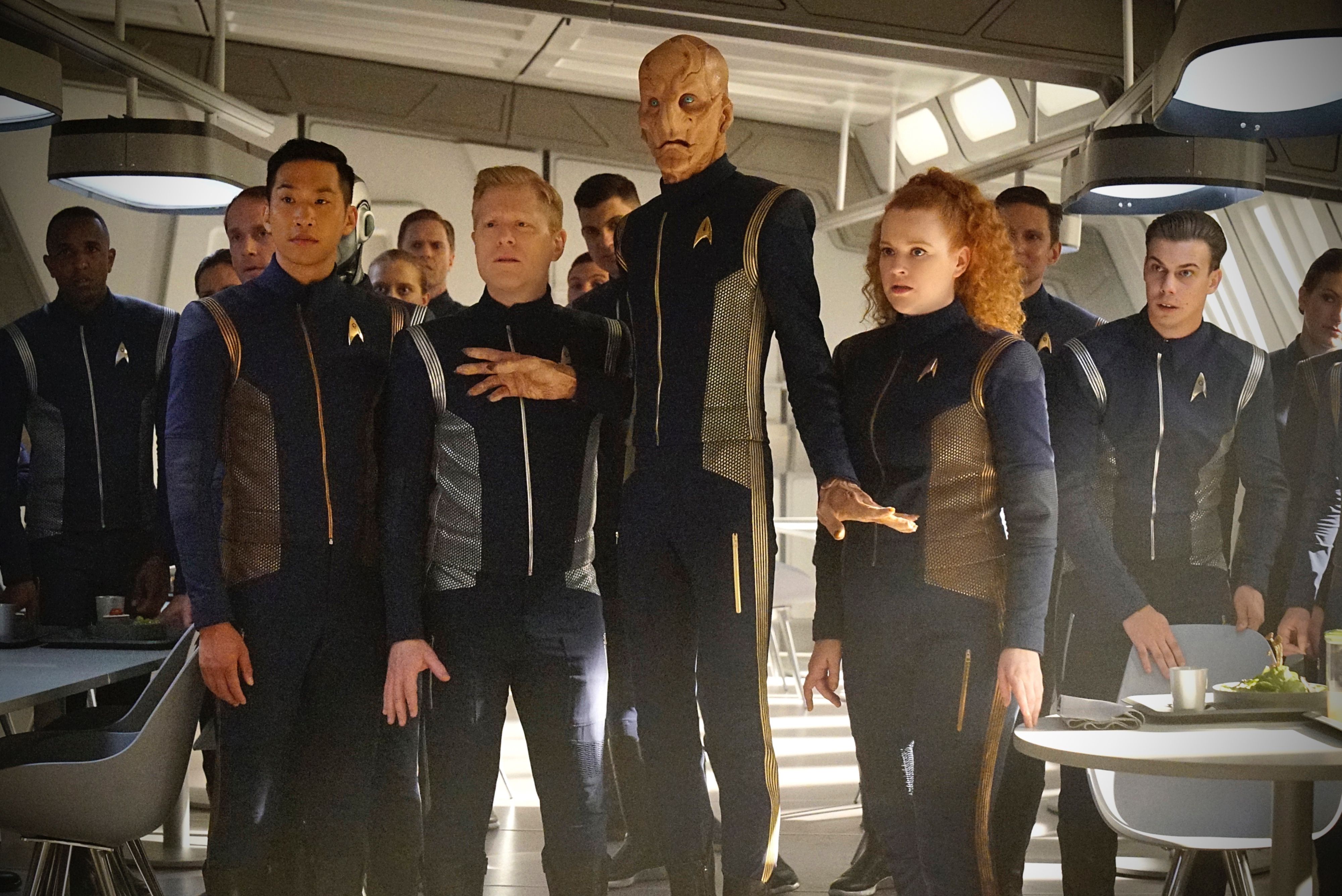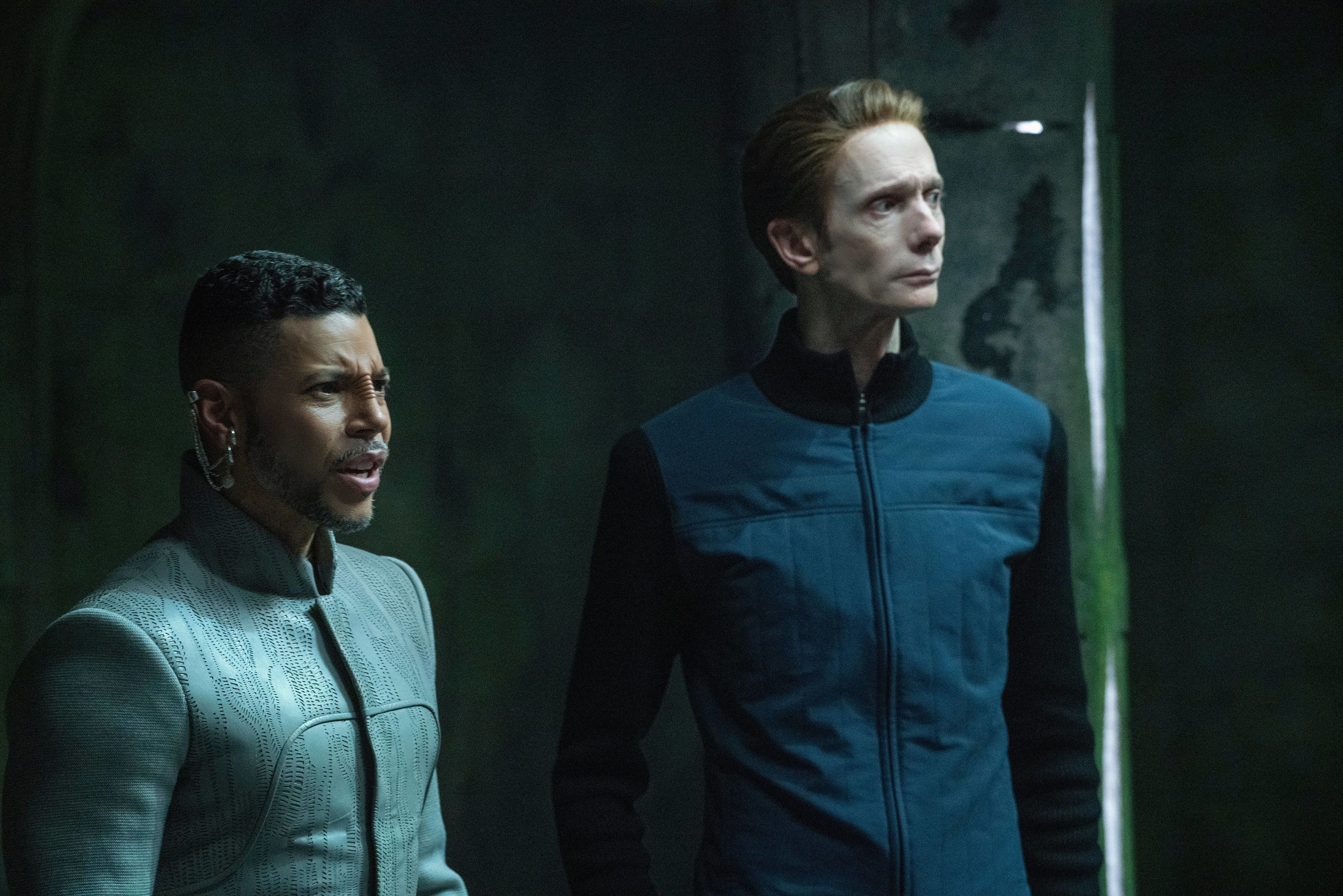With Star Trek: Discovery Season 3 now available on Blu-ray and DVD, I recently spoke to Doug Jones about playing Saru on the hit series. During the interview, Jones talked about what fans would be surprised to learn about the making of Discovery, how nothing about the series is easy, what it was like being in the captain’s chair and why he was happy when it ended, what it’s like trying to make one-hour episode that looks and feels like a feature film, the challenges of trying to deliver a great performance when you’re working 17-hour days, which episodes in Season 3 he was really proud of, and more. In addition, he teases what fans can look forward to in Star Trek: Discovery Season 4 which is almost done filming and how COVID impacted production.
Star Trek: Discovery also stars Sonequa Martin-Green, Mary Wiseman, Anthony Rapp, Emily Coutts, Patrick Kwok-Choon, Oyin Oladejo, Wilson Cruz, Ronnie Rowe, and Sara Mitich.
Check out what he had to say below.
COLLIDER: You know that I'm a big fan of Discovery and your work. I love learning about stuff that maybe I wouldn't normally know. So what do you think might surprise people to learn about the making of Discovery?
DOUG JONES: Maybe how much visual effects are put on in post-production perhaps, except for me. A lot of people ask, is their CG used on Saru to create his look? No, it is every bit practical. Everything is glued onto me. I wear contact lenses, I wear horrible shoes, the whole nine yards. CG is not a part of my look, even though I'm surrounded by it, with visual effects and all kinds of things happening in the show. Would that suffice?
100%. When I speak to people who work on shows for multiple seasons, they all talk about how each season, the process gets more refined, they learn what they can actually shoot in their seven or eight-day shoot. Everything just gets a little bit easier, because the infrastructure has been established. How has the show progressed over the three seasons in terms of, I guess, the making of the show behind the scenes?
JONES: Well, I would never use the word "easy" with our show ever. Even though we're now filming season four, I don't think the process has ever been easy for the show that it's this big and this complicated and this cinematic. I mean, they create a one-hour episode that looks like a feature film and feels like one. So we have not been able to shave our days down per episode. It still takes however many days it takes.
I think maybe what's gotten easier is that people's attitude is like, we now know what to expect, therefore, everyone is accepting of it, of the horrible schedule and how you have to step out of your real life and just dedicate to this show while you're on it. There's a hiatus always coming. So we can just look forward to that. But in the meantime, we you have some work to do.
I think a lot of people think that making a show or a movie is very glamorous, and they don't really understand, especially with a television show, the hours it takes.
JONES: Right. Because my day starts with the makeup process is about two hours ahead of time and another half hour to getting out of the things at the end of the day. So my work day is usually between 15 to 17 hours by the time I'm in and out. If you're doing five days in a row, which it's rare for me, but I'm not in every scene every day, But when I do have a five-day work week, those 15, 17 hour days, oh my gosh, that's a weekend that I can't wait for. You know?
I actually can't imagine. That's crazy hours.
JONES: I get asked all the time about ... People think that the makeup process is the hard part. I'm like, "Oh, no, that's the easiest part of my day." I get to sit back and let someone else do the work on me. But then wearing it and then still having to do all my actor shmactor things. I still have a ton of dialogue to deliver from memory. I still have physicality or an action scene, or a walk down a hallway in these shoes that I'm teetering on. I've got a lot to do while wearing it, and that's where the fatigue comes in, is the 12 hours that we're then beyond the makeup process, where I'm working in it.
Again, not glamorous. Not too many people have been able to say that they played a captain on Star Trek and have gotten to sit in the chair. You are one of those people. What was that experience like?
JONES: Right. Well, the gravity of being a captain in Starfleet is not lost on me. I know that put me in a very small handful of actors, a small club of actors who can say that. But I'm kind of special in that club, because I was the first alien species, the non-human, to be in a captain's chair of a title ship in the Star Trek franchise. So it makes me feel kind of special. So yeah, I do feel awesome.
Even though Saru really wanted to be captain, Doug Jones, not so much, because I felt like the responsibility was a bit above my pay grade. I was like, "No, this is too much." Because when I originally started the show in season one, I knew that I was going to go to rise to first officer pretty quickly in season one.
I've always loved playing second fiddle. I don't want to carry a show ever. So I never bargained for being captain. And so, when I saw that was happening, I asked her the writers room and our showrunner Michelle Paradise, "How long is this going to be for? Because I really don't want to keep it." She said, "No, no, no, don't worry. Season three, we'll work it out. You can hand it over." But I'm like, "Thank you, because I don't know how long I can take it."
So yeah, my work schedule did increase as captain, for season three. Because when you're a captain, every decision that goes through ... Even though Michael Burnham is the lead of our show, every decision, every big thing that happens has to go through the captain's decision-making process too. So he's a part of a way more. So I kind of felt what that was like for a season. I was like, "Yeah, that was about good." I can be done being a captain of Starfleet now.
When you signed on for Discovery, what was your optimistic goal for how many seasons it could actually last for?
JONES: Well, I was originally told five when I was having my first meeting, and that was three showrunners ago. So I was mentally prepared for a five-year commitment. But now…I don't know I haven't really talked to anybody about it. It might be more than that now, I believe. So I have no idea.
I was going to say, it all comes down to what the ratings are around the world. Because if it's successful around the world, they're not going to want to stop.
JONES: Right. Probably. Again, that decision is above my pay grade. I'm happy to admit that.
Are there any episodes that have really stood out for you on Discovery that you're just really proud of?
JONES: Yeah. Well, gosh, I like to think I'm proud of all of them, but I would say, season three specifically, since that what's coming out on the DVD. Toward the end of the season, I think Saru as captain of Discovery, and we're instrumental in finding the root of the Burn, which was our big problem for the season to solve. And it turns out that the cause of that burn, that blew out millions of lives, was a Kelpien, one of my own kind. And we find him. I think that, that whole climactic discovery of, oh, dear, this is what caused the Burn. And Saru being, maybe feeling sort of instrumental in that like, did he enable this to happen?
Because at the end of season two, I helped liberate my planet, my people and bring the Kelpiens and the Ba'ul, who was our prey species, bring them together, so that they could ... Now we're jumping ahead, 930 years in the future, and they have worked together, and they have shared technology and now the Kelpien ...
So there was a Kelpien ship that went to find the planet made of the dilithium, which was going to solve some power shortage problems. And it turns out that ...my little Kelpien friend had a big emotional issue that caused a big event. I'm thinking like, "Now, if I tie that all back together, it can go back to me helping liberate the Kelpiens. Does that make me partially responsible for the catastrophe that happened?" So very heavy. And when you're in a place of authority as a captain, my decision-making process might've been compromised with those emotions attached. So you want to tie that into real life.
By the time season three came out, we were in the middle of a worldwide pandemic and social unrest and all kinds of ... I mean, a year unlike anything I've seen in my entire lifetime. So it kind of was ... There seemed to be a bit of a parallel, that I'd already played this out, where life had changed, and we have to rebuild now.
So that's what I love about science fiction in general, is that it presents possibilities and resolve for conflict and for issues like that, in a dramatic sort of way, that comes to a peaceful resolve. So I would love for real life to take on that peaceful resolve.
I completely concur. I love that season four will have Burnham in the captain's chair. What is that dynamic like?
JONES: Burnham and Saru start off in earlier seasons, a little bit more competitive. They're trying to elbow each other out, to try to get to the captain's chair first. You can tell that they both are very selfish in that way. But as the seasons progress, they go through a lot together, a lot of drama, a lot of laugh, a lot of life. By the season three, they both wanted each other for the chair. Like, "No, no, you take it. No, you take it." They respected each other's talents and gifts and intellects. So, Saru took the chair, humbly, because she insisted upon it. But now by the end of season three, he feels like he's run his course and now has a very ... He feels a tether and a tug to home, to Kaminar, and with this new Kelpien liaison, to get him set up on the home planet and teach him the ways of the Kelpien.
So that's kind of where he's left, and happily gives the captain's chair, knowing that Burnham is fully suited for it, overqualified for it. And just, he has zero fear and trepidation about giving her that captain's chair. So to be a part of that, it's been something that Saru wanted anyway. So there's trust, there's love. There's capability there.
I believe you're near the end of the season four shoot. Am I correct?
JONES: You are correct. We're closing in on it, yeah.
Do you know what you're going to do in the hiatus besides sleep?
JONES: Yes, I'll be flat on my face, snoring for a bit of it. I think that the convention world is opening up a little bit again. I've got some convention dates on the calendar, which I'm very excited to go meet some people out in public again. Then there are a couple of movie possibilities, one that we'd all be excited about, but I am not contracted for it yet. So I cannot tell you about it. But it's something that has been anticipated. So let's hope.
I was going to ask you if it's a Hocus Pocus sequel.
JONES: You can ask that question. I cannot answer it.
When are you and Guillermo working together again?
JONES: I don't know. I've never known, between projects with him. My phone rings when he wants me for something. That's all I know. He's been working on a couple of other projects. But being tied up with Star Trek: Discovery, as you know, it takes the bulk of my year. He's well aware of that. I just haven't been available for lot of his things lately. So we'll see. I have no idea.
That actually leads me to the question I wanted to know. What actually is the timeframe for making Discovery? Is it a six-month shoot? How long does it take?
JONES: We've typically gone eight or nine months, because again, season one was ... We've done 15, 14 and 13, and 13. That's how many episodes per season so far. So that's not like the old school, 26 episodes per season, or whatever it was 24, 26. But with our shorter season, there's still so such huge production value, that we do more days per episode than most one-hour shows. That's why it takes us a bit long.
Now this year, season four, is taking a bit longer, because of our stops and starts and health protocols and keeping everybody safe. But hopefully, in the end, it'll be well worth it, once we see season four.
How did COVID impact your production?
JONES: Yeah, well, we have a whole new department, the COVID safety department, with a whole team of people. So we are all tested three times a week, and there are mask and distancing zones, protocols that keep everybody at a safe distance in their own kind of pod around the set. And if anybody anywhere in the production tests positives, then it's tracked and taken care of very quickly. So we haven't had any issues. We've had a couple of stops and starts because of it. But all in all, it's been a very smooth system.
What are you actually allowed to say about season four?
JONES: Absolutely nothing. But I can tell you that at the end of season three, you see that I am left on my home planet of Kaminar, and Michael Burnham has the captain's chair, and they go off to fly, on a new adventure without me. So the question is that I've gotten from a lot of fans and a question I had to call and ask our showrunner, "Am I still in the show next season?" So it turns out I am.
But with my captain status, I was not demoted. They didn't strip me of my rank. So I do still have captain rank in Starfleet, but where do they plug me in? How do they plug me in? That's yet to be seen in season four.

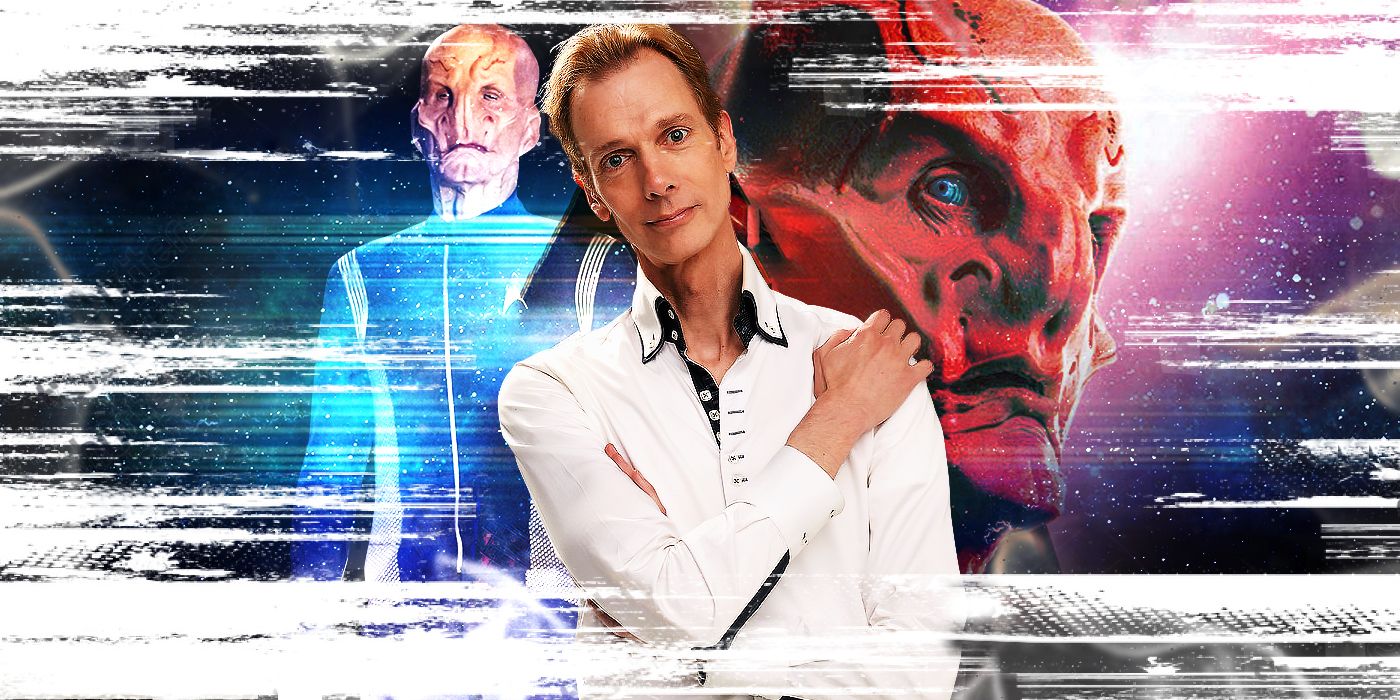
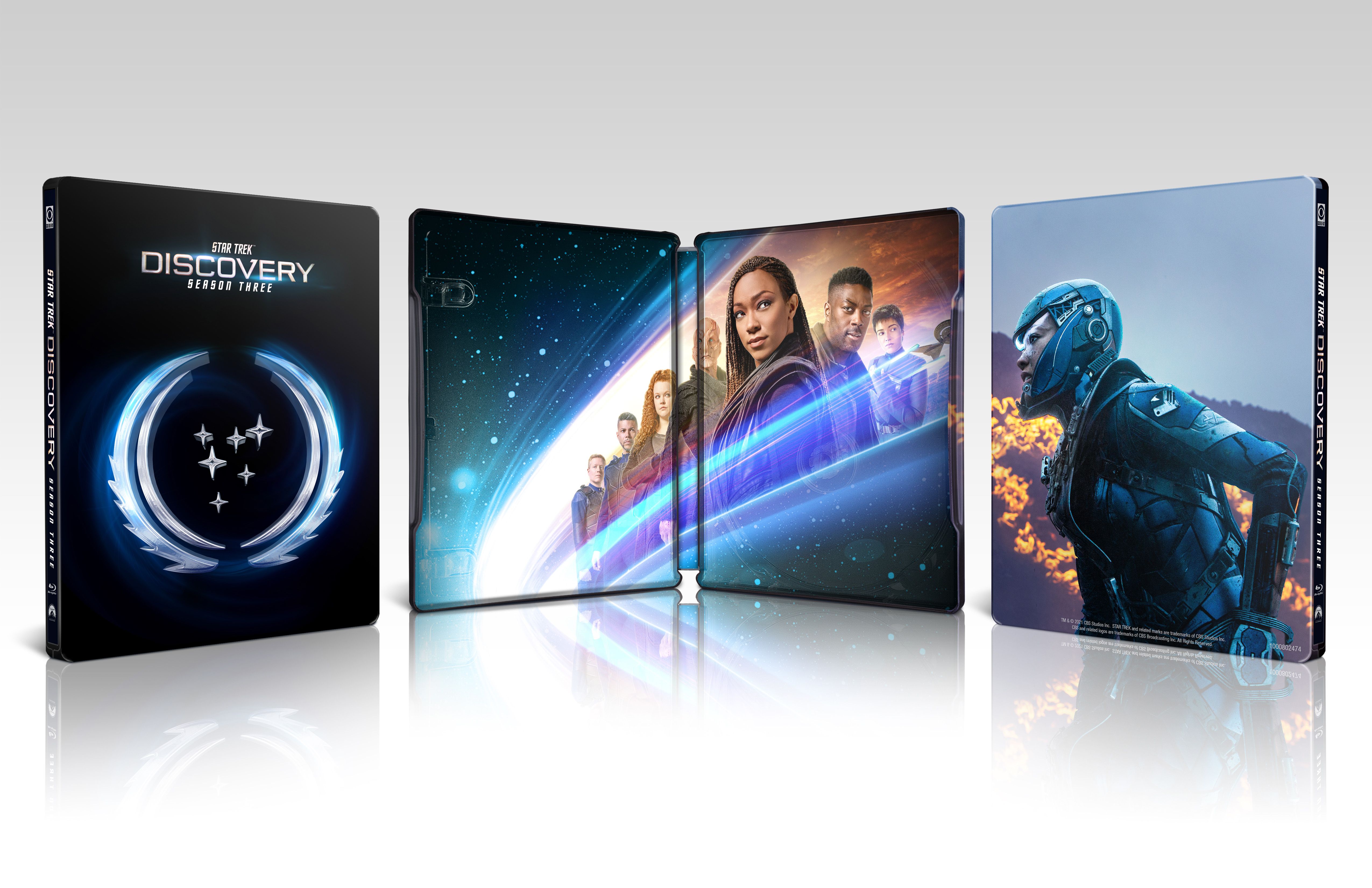
.jpg)
